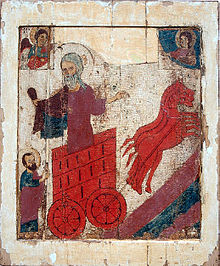DAY 101
The great prophet Elijah leaves the scene (He'll appear again later. Do you remember where?). Elisha takes his place and immediately begins to act as prophet among the people.

DAILY READINGS
2 Kings 1-3 & Psalm 101DAILY NOTES
2 Kings 1- King Ahaziah is injured and he wants to know if he'll live. He seeks input from the prophets of Baal-zebub. Elijah finds out and interrupts Ahaziah's men from going to the prophets.
- Notice that Elijah, that hairy man, is divinely protected by the captain and his men.
- Ahazia never hears from the prophets. Elijah speaks directly to him to tell him that he will surely die.
2 Kings 2
- Where did the idea of a whirlwind come from? Did anyone expect that Elijah would be taken "to heaven by a whirlwind"? Everyone seems to know that today Elijah will be gone.
- Elisha's command to the band of prophets seems to indicate his sense of loss but also a vigor within himself; he is standing up to the prophets.
- Once Elijah leaves (he doesn't die), Elisha takes his place and the band of prophets bow down to him. Had they done that to Elijah? Or anyone else?
- And what happened to Elisha's vigor? He gave in to what the prophets asked him to do.
- The chapter ends with 2 stories about Elisha. He miraculously brings clean water to a community. Then he curses a group of "small boys." This designation probably has less to do with their age and more to do their religious practices. Even though Elisha curses them, he doesn't seem to call the bears to maul them. They just appear. Divine protection?
2 Kings 3
- Before going into battle, King Jehoshaphat (joining forces with "the king of Israel and "the king of Edom") wants to seek input from a prophet about what to do and what will happen. He is told about Elisha. Elisha confesses a "regard" for Jehoshaphat--a regard of his presence or respect. The prophet's feeling, most likely, comes from the Jehoshaphat's "doing what was right in the sight of the Lord (1 Kings 22:43).
- Elisha predicts a victory for the people of God. The king of Moah (Mesha), whose rebellion opened 2 Kings, is defeated....kind of.
- Once Mesha sees that he is losing the battle, he gathers 700 men to attach Edom. They fail.
- Then he sacrifices his son. Yea, where did that come from?
- You could say it worked. The 3 kings do not pursue Mesha. In fact, they withdrew. Were they thrown off by the sacrifice? Did they not want to be a part of such a ritual? Were they scared?
OTHER OBSERVATIONS
Why would Elisha be ashamed? He had been with his teacher. He had seen what had happened to him. Elijah gave him the promise of what he could expect. Why, then, just because the group of prophets pushed him, does he give in? Well, there's our answer: They pushed him to shame.That's a familiar story for us modern readers. But it's also one we don't have to accept.
If God has told you what to do, don't worry about what others want to shame you into doing. Sure, be wise and seek advice and input. But don't let shame lead your walk with God. And don't let others try to shame you into something you know is not what God has called you to do.
I'm not convinced God wants to shame us into doing anything.
Stay blessed...john
Comments
Post a Comment